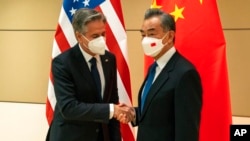U.S. Secretary of State Antony Blinken and his Chinese counterpart discussed on Friday the need to maintain open lines of communication to manage the relationship between Beijing and Washington, especially during times of tension.
Following their meeting in New York on the sidelines of the U.N. General Assembly, a statement from State Department spokesperson Ned Price said Blinken "stressed that preserving peace and stability across the Taiwan Strait is critical to regional and global security and prosperity."
In its statement on the meeting, China’s foreign ministry said the U.S. is sending a “very wrong and dangerous signal” on Taiwan and that the more rampant the Taiwan independence activities are, the less likely a peaceful solution will be.
"The Taiwan issue is an internal Chinese matter, and the United States has no right to interfere in what method will be used to resolve it," Chinese Foreign Minister Wang Yi said, according to the ministry’s statement released Saturday.
Tensions between Beijing and Washington have risen in recent months, following pledges from President Joe Biden that the U.S. will defend the self-governed island, which China claims as its own, should Beijing attack. House Speaker Nancy Pelosi's trip to Taiwan in August also drew Beijing's criticism for what it said was meddling in what it considers an internal issue.
Earlier this week, Biden said in an interview that U.S. troops would be involved in defending Taiwan, "if in fact there was an unprecedented attack."
Later, White House officials insisted the president's remarks were consistent with Washington's long-standing "one China" policy, which remains committed to maintaining peace across the Taiwan Strait. Since 1979, Washington has said the People's Republic of China is the "sole legal government of China," but the U.S. has never recognized Beijing's claims of sovereignty over Taiwan.
Beijing has said a draft bill in the U.S. Congress would violate Washington's "one China"policy. The Taiwan Policy Act could significantly increase American support for Taiwan by providing billions of dollars in defense capabilities.
One sponsor of the bill, Democratic Senator Bob Menendez, told VOA Mandarin this week that the president's view about the U.S. commitment to defend Taiwan was shared by many in Congress.
"I think that what's important now is to strengthen Taiwan's ability to deter China from going ahead and seeking to invade, so that we don't have conflict. At the end of the day, we don't seek conflict, but we also don't want Taiwan to be taken by force," he said.
Republican Senator Rob Portman, another supporter of the bill, told VOA that the U.S. has an obligation in Taiwan.
"We look what's happening in Ukraine, where the United States, at least 45 other countries have stepped forward to provide military assistance, so that Ukraine can defend itself. That might be a similar analogy," he said.
The Taiwan legislation has bipartisan support, but it's unclear if the measure will pass this year.
Other lawmakers told VOA that the measure is aimed at avoiding conflict by ensuring it does not start.
"I think we are very much committed to resolving the status of Taiwan peacefully. The message is very clear to mainland China that force would not be acceptable," Democratic Senator Ben Cardin told VOA.
Earlier this week, Wang told an audience in New York that Taiwan is "growing into the biggest risk in China-U.S. relations. Should it be mishandled, it is most likely to devastate our bilateral ties," according to a transcript provided by China's foreign ministry.
Next week, Vice President Kamala Harris is to visit Japan and South Korea for meetings with top officials and for the funeral of former Prime Minster Shinzo Abe. The White House told reporters Friday that she was expected to discuss a range of security and diplomatic initiatives with the leaders of Japan and South Korea, including the importance of preserving peace and stability in the Taiwan Strait.
Yi-Hua Lee, Patsy Widakuswara, Margaret Besheer and VOA's Mandarin Service contributed to this report.






